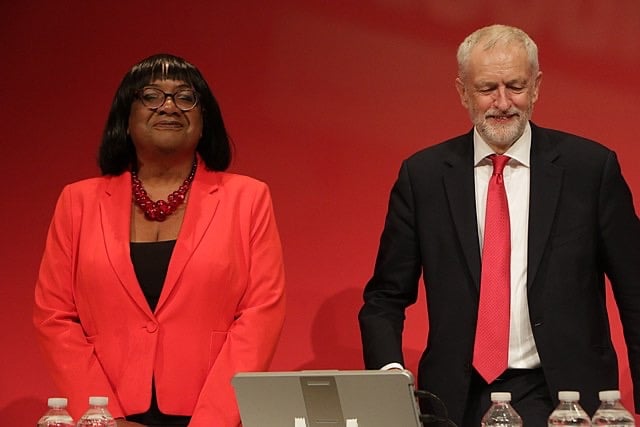Diane Abbott has revealed she advised Jeremy Corbyn against setting up a new political party, warning that Britain’s first-past-the-post voting system would make it “very difficult” for any new party to win.
The suspended Labour MP, who served as Corbyn’s shadow home secretary when he led the party, told an audience at the Edinburgh Book Festival that she had spoken to him before the launch of his new political venture and counselled against it.
“There were people around Jeremy encouraging him to set up a new party, and I told him not to,” Abbott said whilst promoting her memoir ‘A Woman Like Me’ on Thursday. “It’s very difficult under first-past-the-post system for a new party to absolutely win.”
The Hackney North and Stoke Newington MP added: “If it wasn’t first-past-the-post, then you can see how a new party could come through, but I understand why he did it.”
Despite her reservations about the electoral system, Abbott predicted the unnamed party – temporarily marketed as “Your Party” – would perform better than expected. “I think Jeremy’s party is going to do a lot better than people think because a lot of people who are not necessarily terribly left-wing people, are a tiny bit disappointed about the way we’ve gone in the past year,” she said.
Corbyn launched the new venture last month alongside former Labour MP Zarah Sultana, with the party claiming to have attracted over 700,000 sign-ups. The party, which still lacks an official name, will hold its founding conference in autumn where members will decide its direction, leadership model and policies.
Abbott’s comments came as she faces her own political uncertainty, having been suspended from Labour for a second time in July over controversial remarks about racism. Party officials are reportedly weighing up candidates to replace her in the seat she has held since 1987, raising concerns among her supporters that her political future has already been decided.
The veteran MP, who became Britain’s first Black female MP and is now the longest-serving female member of the House of Commons, was suspended after telling BBC Radio 4 she had “no regrets at all” about comments comparing racism experienced by people of colour with prejudice faced by Jewish, Irish and Traveller communities.
“Clearly, there must be a difference between racism which is about colour and other types of racism,” Abbott said in the interview. “I just think that it’s silly to try and claim that racism which is about skin colour is the same as other types of racism.”
Her suspension follows a similar incident in 2023 when she wrote to The Observer suggesting that whilst Jewish, Irish and Traveller people experience prejudice, they “are not subject to racism all their lives” unlike Black people. Though she later apologised and was readmitted to Labour before the 2024 election, her recent reaffirmation of these views led to her current suspension.
Despite her criticism of Labour’s current direction under Sir Keir Starmer, Abbott indicated she would not be joining Corbyn’s new party. She expressed disappointment with the government’s policies, saying: “It’s a tricky state of play. I wouldn’t have thought that you’d have a Labour government and they’d be cutting winter fuel allowance for the elderly, they’d be cutting benefits for the disabled.
Abbott also condemned the government’s decision to ban Palestine Action as a terrorist group, calling it a “disgrace” and “absolutely dreadful” during her Edinburgh appearance.
Chancellor Rachel Reeves launched a scathing attack on Corbyn’s new party during her own Edinburgh Fringe appearance earlier this month, claiming the former leader had “tried to destroy my party” during his tenure. “The country has rejected him twice. The bloke’s got a big ego. He can have another go but I think the country will have the same verdict,” Reeves said.
Corbyn’s party faces significant challenges in Britain’s electoral system, where first-past-the-post voting has historically made it difficult for new parties to break through. Reform UK, despite polling at around 25 per cent nationally, won just five seats in the 2024 election, illustrating the system’s barriers to new entrants.
However, polling suggests a Corbyn-led party could attract 10-15 per cent of the vote, with 31 per cent of 2024 Labour voters reportedly open to switching allegiance. The party is expected to contest the May 2026 local elections as its first electoral test.
As Abbott awaits the outcome of Labour’s investigation into her suspension, her political future remains uncertain. Sources close to the situation suggest party officials are already informally discussing potential replacements, though Labour maintains no formal decisions have been made.
Follow for more updates on Britannia Daily



